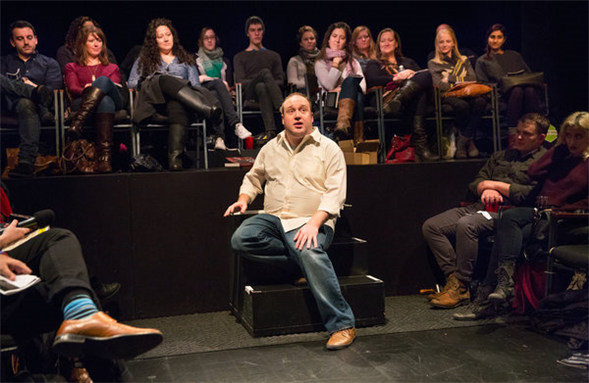By MARK BLANKENSHIP
You're closer than you realize to co-starring in an Off-Broadway play. Just buy a ticket to Every Brilliant Thing, now at the Barrow Street Theatre, and you could easily land a significant role.
That's because the show relies on audience participation, and in a meatier, more dramatic way than you'll find at a typical improv night.
As the unnamed narrator (played by British stand-up comedian Jonny Donahoe) tells the story of his mother's suicidal depression and his own attempts to cure her, he enlists the crowd to play the people he loves. Randomly chosen patrons portray his father, his love interest, and even his veterinarian, and through some ingenious work by playwright Duncan Macmillan, they're able to seriously impact the story.
At one point, for instance, the narrator tells us his therapist liked to play a game with him during their sessions, and based on how the selected audience member responds, he adjusts the rules. That leaves the civilian looking correct, no matter what.
And then there's the list. When he's a little boy, the narrator's strategy for "curing" his mom is to create a numbered list of every wonderful aspect of the world. As he calls out numbers, audience members read the corresponding "brilliant thing" on a paper that Donahoe has given them before the show. By the end of the sixty minute production, which comes to New York after successful runs in England and Scotland, we've all become a chorus of celebration.
Crucially, the list (as well as Donahoe's feisty performance) makes this play about depression and suicide feel buoyant and nuanced, not viciously dark or cheaply optimistic. As Macmillan says, "There's a way of talking about it that's sincere and funny and accessible and tries to communicate the complexity of the issue without being mawkish about it. That's the tightrope walk."
The impact depends, of course, on Donahoe finding people who want to participate, but that's why he spends 20 minutes circulating through the house before showtime, passing out pieces of the list. "During that, I cast the play," he says. "I try to get people involved in the spirit of sharing something. It would be very easy to give those sheets to the ushers and say, 'Here you go! Hand them out at random!', but that's not what we're creating."
Donahoe stresses that even after he's found people who seem game, his goal is to make them feel relaxed. He'd much rather they seem like real people than actors. "If you tell someone to be funny, that kills their ability to be in any way entertaining," he says. "If you tell someone you want them to be heartfelt and genuine, they'll fool around. In my view, the trick to improv is just to be very honest. Hopefully, that's what comes across."
A commitment to honesty underscores why Macmillan built his play around audience participation in the first place. It's not intended to be a gimmick, but a theatrical manifestation of how depression touches all our lives.
"Everyone deals with depression," Macmillan says. "Part of the gesture of the show is saying, 'If you ever feel really low, then you're not alone. Look around you. People are laughing at the same things you might be laughing at. They're crying at the same things you might be crying at. You are not alone.'"
The rest of the production, which is directed by George Perrin, echoes that togetherness. That's why Donahoe constantly moves throughout the theatre as he performs and why the lights never go down over the crowd. Macmillan explains, "Saying this in a room full of people with the lights up, where we're all in a community and laughing or crying at things we know are true, is a very cathartic experience."
---
Mark Blankenship is TDF's online content editor
Photo by Matthew Murphy
